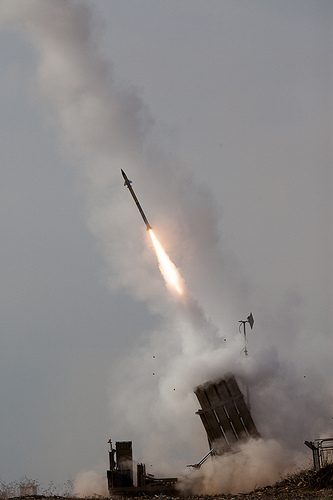Israel’s Fighting Retreat

I’ve avoided writing anything so far about the latest Gaza war because it’s just too depressing. But I can’t ignore the situation entirely. So, a recap of points I feel like I’ve made 100 times before (at at least twice on my old blog), and which unfortunately never stop being relevant.
Israel’s policy, since at least 1993, has been a fighting retreat.
Israel ceded territory to the PLO at Oslo without settling any of the most contentious issues that fuel the conflict between Jews and Palestinian Arabs.
In 1996, Israel’s Labor government launched a massive attack on Lebanon, in an effort to cripple Hezbollah. A few years later, the next Labor government withdrew unilaterally from Lebanon, leaving Hezbollah (the spawn of their 1982 invasion) the most potent force in that country. The 2006 war on Lebanon degraded Hezbollah’s capabilities temporarily, but strengthened the organization politically.
When PLO leader Yasser Arafat launched a massive wave of terror attacks against Israel, the Israelis elected arch-hawk Ariel Sharon, who ultimately led an Israeli response in Operation Defensive Shield. A few years later, that same Ariel Sharon withdrew unilaterally from Gaza, leaving Hamas (the spawn of the Israeli occupation) the most potent force in that territory. The next Kadima government’s war against Gaza in 2008 degraded the “terrorist infrastructure” in the territory, but strengthened Hamas politically. It looks likely that the current war will have the same effect.
It’s possible that Hamas will, when this is all over, have emerged as Israel’s only plausible Palestinian negotiating partner, and will have won a loosening of the embargo, and have achieved these things on the battlefield. Or they may get less than that – but, bottom line, this war will have been another round in which Israel achieves the tactical objectives it set at the outset, but its enemies achieve their strategic objectives.
Israelis are rightly terrified of what the increasing sophistication of their enemies’ missiles portends. The next iteration of the conflict will see more powerful missiles falling across the most densely-populated portion of of their country. The Israeli response to such an eventuality will, presumably, be even more horrific. And when that round is over, Israelis and Palestinians will be facing exactly the same questions about a final settlement that they are today, and that they have been since 1988 when Jordan took itself out of the equation.
Although the day-to-day makes me exceptionally pessimistic, looking from 20,000 feet I actually feel modestly optimistic. Why?
First, because the conflict in Gaza has remained a one-front war, just as the past conflicts in Lebanon have remained. For all the substantial solidarity that exists in the Arab and Muslim world against Israel, individual actors in this depressing drama are still driven by their own self-interest. Hezbollah has lined up with its patron – Assad – and hence against other supporters of the Palestinian cause – Turkey, the Gulf states – who are supporters of the Syrian rebels. As well, as Hezbollah has gained power and status in Lebanon, it has more to lose by provoking an Israeli response. When it comes right down to it, taking big risks for other people’s conflicts is never terribly popular. And so, Hezbollah has stayed out.
That should encourage Israelis about the long-term trajectory of Hamas, as well. Winning on the battlefield will, on the one hand, encourage radicals who support violence; but, on the other hand, the more established Hamas becomes, the more they have to lose. In the long run, Israel is not particularly well-served by Quisling regimes, because such regimes cannot actually deliver on any promises they make. Israel can only make a durable peace with an opponent of unquestionable legitimacy. And this war just gave Hamas a bit more legitimacy.
That doesn’t mean that a Hamas victory – which, to one degree or another, is what is likely – will make the prospects of peace more likely in the short term. Nothing will make the prospects for peace more likely in the short term. But a thoroughly legitimate Palestinian leadership is a necessary if not sufficient condition for any kind of final settlement – a settlement that will require a Palestinian retreat from maximalist positions on repatriation (something “everyone” knows will be forthcoming – everyone, that is, except the Palestinian people). And the most plausible route to legitimacy for any nationalist movement is through armed opposition to the colonial power.
Necessary, but not sufficient. The Israeli far-right could be correct about the “eternal” nature of hostility to Israel. If they are, though, then Israel is doomed. Even the most heavily-armed Jewish state won’t be able to hold out against the determined opposition of the entire Arab and Muslim world. Israel’s survival is premised on the notion that under some set of circumstances, the Muslim world will accommodate itself to the existence of the Jewish state. That is, it is premised, ultimately, on the notion that everybody can be motivated by self-interest.
If that is the case, the only question is when it will become clear to both sides that self-interest dictates a mutually-agreeable solution. Unfortunately, the history of the conflict to date suggests that this will only happen when the Palestinians have enough to lose from initiating conflict that peace is preferable to continuing to fight, and Israelis have retreated to the point where they truly have nothing else they can concede without losing their state – when all the bluffs and phony red lines are past.
It would be nice if we could get there without years of additional violence, but I wouldn’t bet on it.
Comments